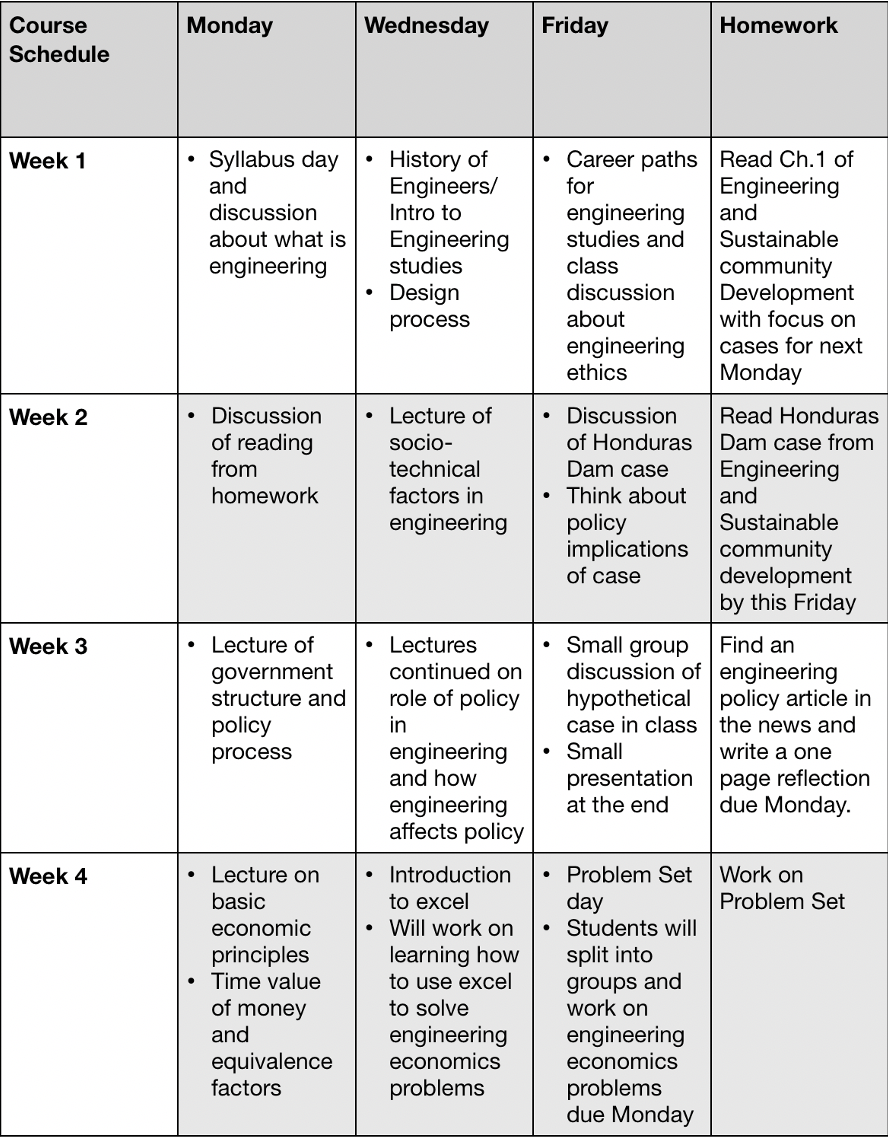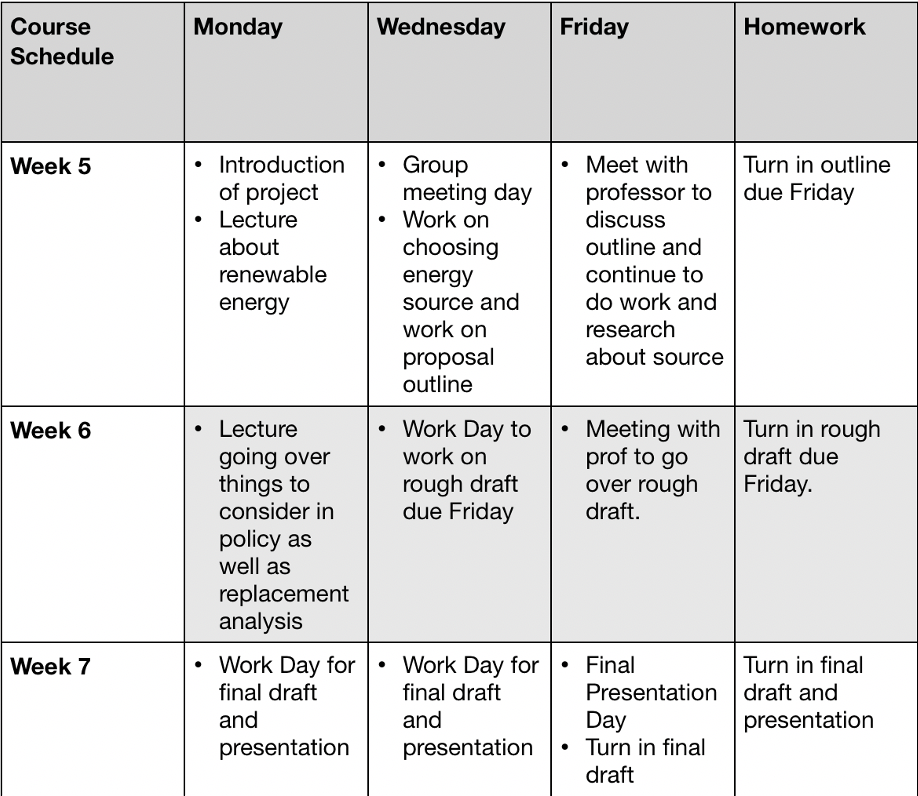ES101
Socio-technical engineering
Professor TBD, AEC 315, Fall 2022
Catalog Description
This course teaches the fundamentals of socio-technical engineering. Students will use engineering design processes to aid them in: recognizing the need for an socio-technical engineering solution, defining the effects of economic, political, ethical and community contexts, among other aspects of engineering design. Instructors will integrate societal contexts of engineering practice and use that to help students gain the understanding to do the same and examine the implications of socio-technical engineering solutions.
Class Meeting Time and Location
Section 10: MWF 8:00 AM to 9:15 AM, AEC 315 Section 11: MWF 11:00 AM to 12:15 AM, AEC 315
Office Hours
All sections: MW 10:00 AM to 10:50 AM, AEC 244 (or by appointment)
Abstract
Socio-technical engineering is essential in today’s modern world to meet the needs of individuals and societies. Having engineers engage in non-technical skills that will allow them to approach problems is crucial. Our focus in this ES 101 model is on introducing students to the engineering studies major and socio-technical problem solving.
Expectations
Our classroom is a place for discussion, not a lecture hall. You are expected to actively participate in these discussions and to work on particular projects – generally in teams – that allow you and your fellow students to learn by doing, learn by observing the results of others, and to learn from one another while trying out new ideas. What you learn will depend directly on your willingness to participate and be involved. So do not be afraid to participate and get involved with discussion. Not everyone has the right answers and by listening and engaging you will be able to expand your knowledge on these topics.
Required texts
There is no required textbook for this module. The few readings for this class will be given in PDF form for students to print or access on their personal devices.
Student Learning Outcomes
Upon completion of this course, students will be able to:
- Understand what Engineering Studies is and the importance of interdisciplinary engineering education
- Understand the engineering design process
- Apply a socio-technical analysis of open-ended engineering challenge
- Be able to recognize that engineering at Lafayette and beyond is innovative and exciting
- Have experiences using engineering equipment, tools, software, and hardware appropriate to the topic of the course
- Be able to identify social, ethical and economics issues surrounding the information for projects
- Develop organization, management and teamwork skills
- Gain experience conveying engineering information in a written report
Grading Scheme
Note: Students must successfully complete both modules and graphics to pass the course. This module: The grading breakdown within the Socio-technical engineering module is shown below.
Homework: All homework assignments will be due at the beginning of class, unless otherwise specified. If you arrive late to class, your homework is also late. Late homework assignments will be penalized by 25% for each day the assignment is late. All homework assignments must be earnestly completed by the end of the seven week module to pass.
Final Presentation and Final report group energy project will be introduced in the third week of the module with details concerning these assignments.
Attendance: The success of this course is highly dependent on your active participation with your design team and with the class. As such, only three unexcused absences will be allowed. You will be considered absent if you arrive to class more than 30 minutes late or not at all. The first unexcused absence will not be penalized. The second unexcused absence will reduce your module grade by 5%, and your third unexcused absence will reduce your module grade by an additional 10%. Disciplinary action for students with greater than three absences will be handled on a case by case basis.
Participation: How do you get a perfect participation grade? Come to each class prepared and on time, con- tribute to class discussions at least once a week (hopefully much more!), allow other students to contribute, and maintain a high level of respect and professionalism with your peers.
Graphics: Prof. Rosenbauer will inform you.
Co-curricular activities:
Students are required to attend a minimum of five co-curricular events during the semester. These events must include the Resnik lecture on November 28th and at least four other ES101 co-curricular events. Stu- dents are welcome to attend more than five events. If a student cannot attend the Resnik lecture, then the student may attend an additional two ES101 co-curricular events to substitute for the Resnik lecture missed to receive full credit for the co-curricular component of the course.
Grading for co-curricular component:
- Attendance at 5 or more events = 100%• Attendance at 4 or more events = 80%• Attendance at 3 or more events = 60%• Attendance at fewer than 3 events = 0%
| Module A | 40% |
| Module B | 40% |
| Graphics | 15% |
| Co-curricular | 5% |
| Homework | 25% |
| Final Presentation* | 25% |
| Final Report* | 20% |
| Attendance | 15% |
| Participation | 15% |
3
Students will need to reserve a slot for all noontime co-curricular events. A link to a video describing the reservation process will be sent to students at the beginning of the semester. Lunch will be served at these events and in most cases the students’ meal plan will be charged for the lunch. IMPORTANT: Students are expected to act in a professional manner during all of the co-curricular events. Use of cell phones, reading non-related materials, talking, or other rude behaviors will not be tolerated. This is a college course and students are expected to behave accordingly.
Disability Statement
In compliance with Lafayette College policy and equal access laws, I am available to discuss appropriate academic accommodations that you may require as a student with a disability. Requests for academic accommodations need to be made during the first two weeks of the module, except for unusual circumstances, so arrangements can be made. Students must register with the Office of Advising and Co-Curricular Programs for disability verification and for determination of reasonable academic accommodations.
Privacy Statement
This course uses Moodle course management system. Moodle contains student information that is protected by the Family Educational Right to Privacy Act (FERPA). Disclosure to unauthorized parties violates federal privacy laws. Courses using Moodle will make student information visible to other students in this class. Please remember that this information is protected by these federal privacy laws and must not be shared with anyone outside the class. Questions can be referred to the Registrar’s Office.
Federal Credit Hour Compliance
The student work in this course is in full compliance with the federal definition of a four credit hour course. Please see the Registrar’s Office web site (http://registrar.lafayette.edu/files/2013/04/Federal-Credit-Hour- Policy-Web-Statement.doc) for the full policy and practice statement.
Academic Integrity
To maintain the scholarly standards of the College and, equally important, the personal ethical standards of our students, it is essential that written assignments be a student’s own work, just as is expected in examinations and class participation. A student who commits academic dishonesty is subject to a range of penalties, including suspension or expulsion. Finally, the underlying principle is one of intellectual honesty. If a person is to have self-respect and the respect of others, all work must be his/her own.


To read our Conclusion, click here!